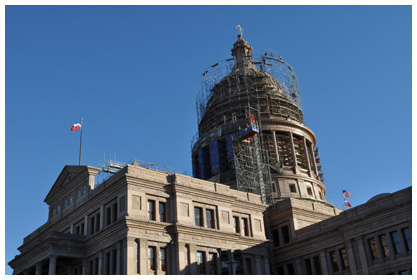 On May 27th, Governor Rick Perry signed into law a groundbreaking measure that will expand the ability of local law enforcement agencies to arrest employers who cheat their workers out of their pay. Texas SB 1024, the “Wage Theft Bill”, which was sponsored by Senator José Rodriguez (D-El Paso) and Representative Eddie Rodriguez (D- Austin), creates a powerful mechanism for workers to recover their unpaid wages.
On May 27th, Governor Rick Perry signed into law a groundbreaking measure that will expand the ability of local law enforcement agencies to arrest employers who cheat their workers out of their pay. Texas SB 1024, the “Wage Theft Bill”, which was sponsored by Senator José Rodriguez (D-El Paso) and Representative Eddie Rodriguez (D- Austin), creates a powerful mechanism for workers to recover their unpaid wages.
Wage theft is a widespread problem that occurs when employers fail to pay their employees for their work. In certain industries like construction, wage theft occurs in epidemic proportions. According to the University of Texas study Building Austin, Building Injustice: Working Conditions in the Texas Construction Industry, one in every five Austin construction workers has been denied payment for their work. Wage theft also undercuts responsible businesses who can’t compete, and hurts working families by forcing them to face unexpected hardships.
The Wage Theft Bill makes it easier for police departments across Texas arrest employers who don’t pay their workers, and closes an important loophole that up to now has allowed employers to avoid criminal theft of services charges by making a minimal payment to their workers.
A press release from the Workers Defense Project, a community organization which assisted in drafting the new law, cites the story of Carlos Ovidio Madrid, a construction worker who was owed over $2400 by his employer for work he completed in late 2010. Madrid stated: “I worked hard and did my part but my employer didn’t want to pay what he owed me. It was really hard on my family – I could barely buy food and clothes for my kids.” In February 2011, he took his case to the Austin police department but was told by the police that they couldn’t take his case since his employer had paid Carlos for his first few weeks of work. Under the new law, local police would be able to recover Madrid’s wages. Senator Rodriguez declared: “The Wage Theft Bill is an important victory for Texas workers, especially in this legislative session where workers’ rights have been under attack. This new law will ensure that thousands of hardworking Texans receive their fair pay.”
Senator Rodriguez declared: “The Wage Theft Bill is an important victory for Texas workers, especially in this legislative session where workers’ rights have been under attack. This new law will ensure that thousands of hardworking Texans receive their fair pay.”
Andrew Schneider of Houston public radio station KUHF news spoke with Emily Timm of the Workers Defense Project about the new law. Timm remarked: “Wage theft occurs across the board. It’s sort of the way business is done in particular industries, in particular, the construction industry.”
In the Workers Defense Project press release, Timm further stated: “This bill clarifies that employers who shirk their responsibilities can be charged with criminal theft of service. Prosecutors and law enforcement officials all over Texas will be able to use this to send a strong message to employers who cheat their workers.”
The new law goes into effect September 1, 2011.
Texas Legislature Passes Groundbreaking Wage Theft Bill
by Elizabeth McPherson | June 09, 2011



Comments
Texas Wage Theft Law - Senate Bill 1024
What took them so long to right this wrong?
Pictures
I would like to see the pictures of these employers on the news papers and in the news. So that when they close that business, and re-open under a new name, their picture will be associated with their new business name.
wage theft law
now we create a criminal quagmire and bureaucratic procedure
involving hundreds of dollars on the simple say so of an employee
claiming he did not get his full 8 hours paid
Now the police are mediators on the side of the employee
cesar is a moron
What about those of us on the clock who work through our breaks and lunches and are not compensated. Time and time again I have had my employer manipulate the clock so when I clocked in at 3 the clock would automatically roll my start time to 330 or clocking out at 315 because somebody showed up late to replace me and my clock out time being logged at 3. Its not just the employees say so when the times are documented. You ever heard of a time card moron???
Add new comment